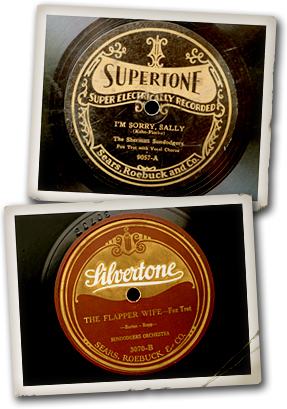 |
 |
 |
 |
 |
 |
 |
 |
 |
 |
 |
History

Coincidence? Irrelevance? You decide!
"The Sun Dodgers", a musical comedy, opened at the Broadway Theatre in New York on November 30th 1912. It closed after 18 performances on December 14, 1912. Nora Bayes and Jack Norworth, the authors of "Shine On Harvest Moon", grace the cover of this sheet music representing the show.

About this time, in far off sunny California, a group on San Francisco artists and writers christen one of their Bohemian Grove retreats "Sundodgers Camp". Their motto: "Weaving Spiders Come Not Here" (Act 2, scene 2 of "A Midsummer Night's Dream") and their icon, a large owl.

In 1917 a Vaudeville unit that went under the name of "The Shrapnel Dodgers" had a fleeting success with the Sherwood and Donaldson song "Are We Downhearted? No! No! No!" This would undoubtedly have been a very short time after America entered World War One.

Prior to 1921, the "Sun Dodger" was the University Of Washington's newsletter and the name used by its sports teams. The name was changed to "Huskies", possibly to promote a less solar deficient image. "Sundodgers" is currently the name of the University Of Washington's Men's Ultimate Frisbee Team.


|
 |
| |
New York, 1928, a dance band called "The Sherman Sundodgers" a pseudonym for Vic Price and His Orchestra, (perhaps also a pseudonym) record for the Gennett label. Some of these sides are also issued on the obscure Herwin and Silvertone dime store labels.

About seventy five years later, back in far off sunny California, a small group consisting of educators, record collectors, parents, luthiers, plant people, book people, flea market and thrift store devotees, Joan Blondell fans, Victor Orthophonic owners, expatriate Southern Californians, and foodies, numbering five in total, form a musical unit and call themselves Dodge's Sundodgers, blissfully ignorant of much of the foregoing.

Coming from diverse musical backgrounds and sharing a common love of stringed instruments, be they ukuleles, banjos, or stroh-violins, the group looks back for inspiration along some of the forgotten byways of American musical culture, and is often surprised to find some rare neglected gem shining in its path that is fantastic to behold, yet harder than hell to learn how to play. Currents of Hawaiiana, Ragtime, Western Swing, Mexican Renaissance, Parlor Songs, and 1920s Jazz inform their musical meanderings, with always a surprise in store for those who fancy that they have heard everything. |
 |
|
|
|

|
|
 |